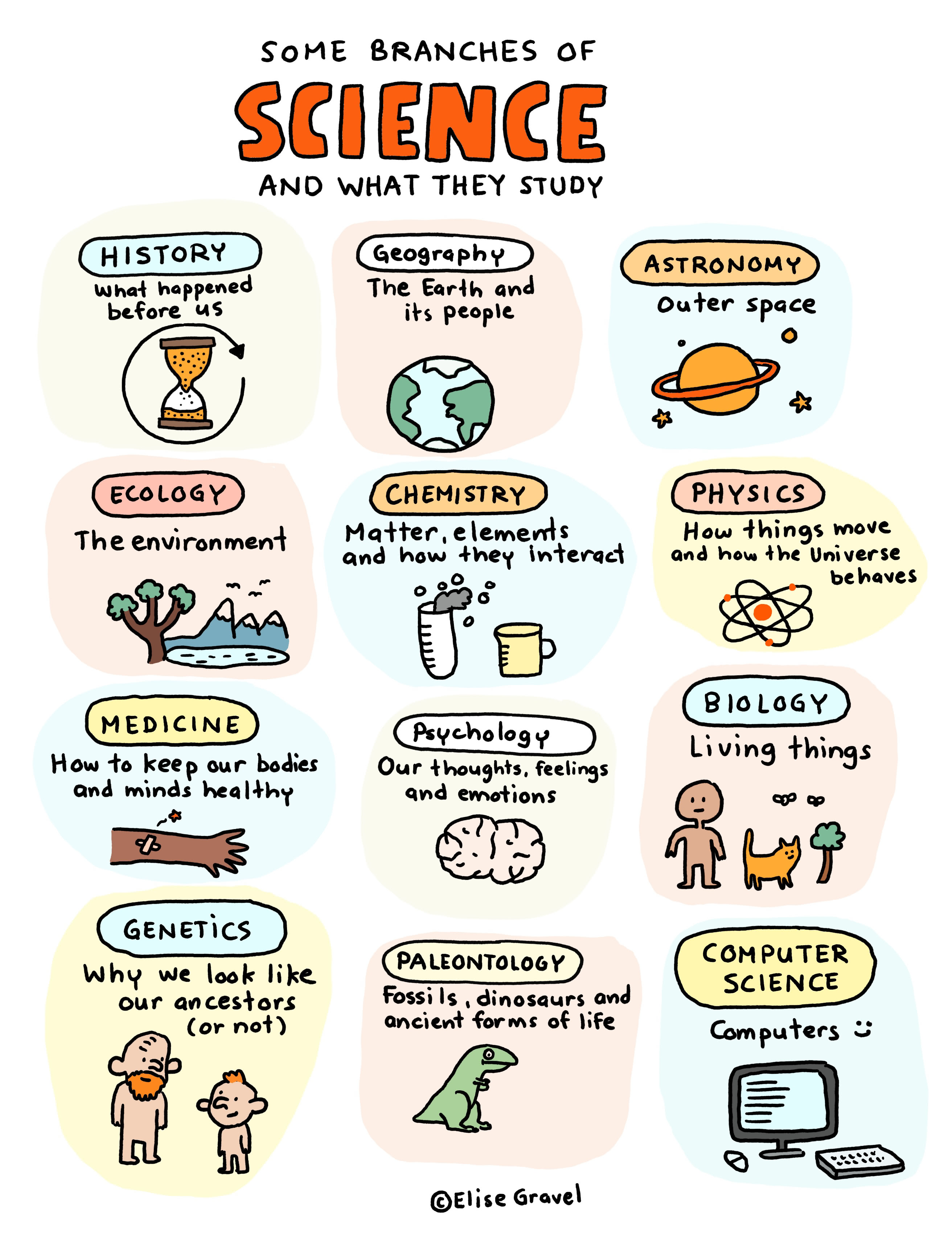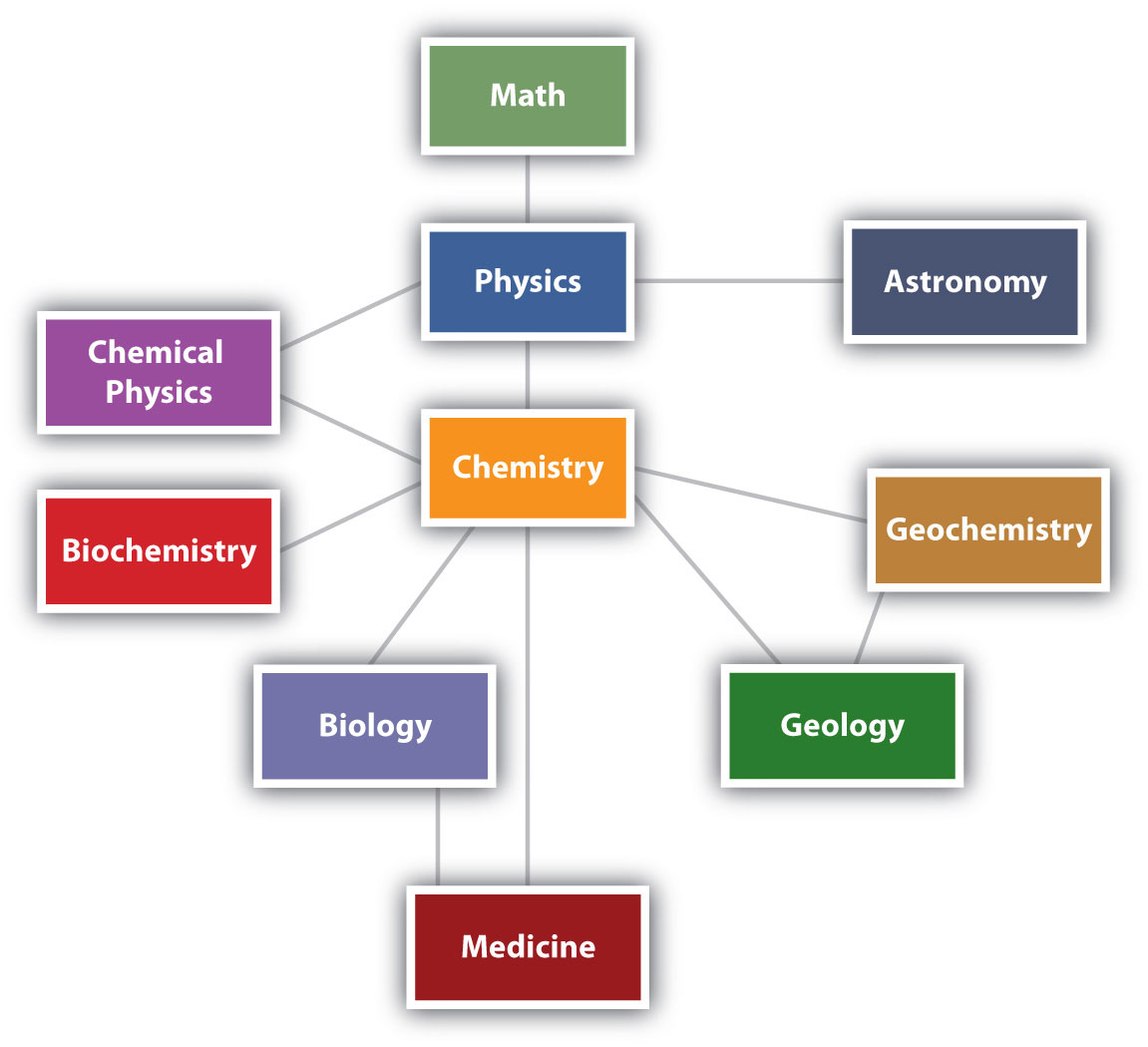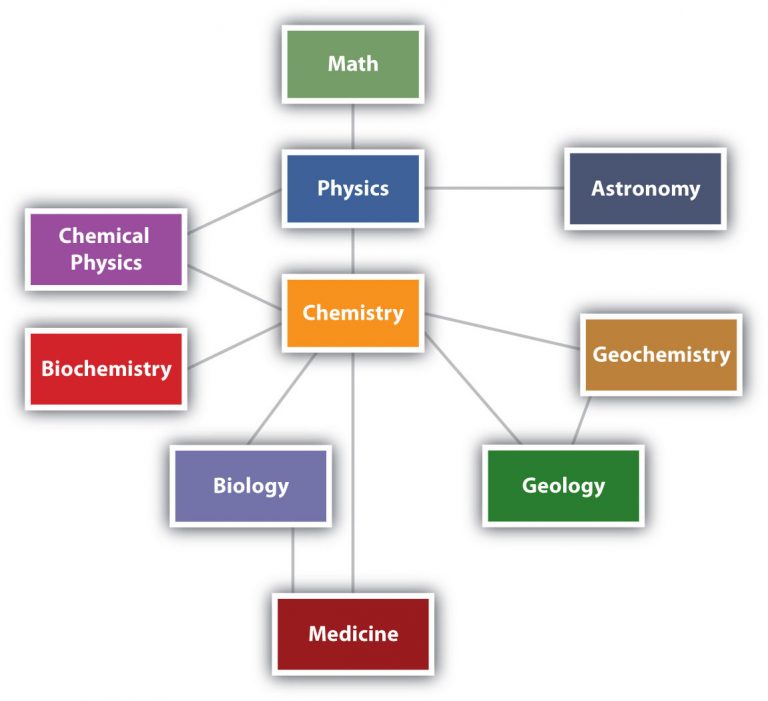Science is the scientific observations of nature’s unclear events. In addition, science evolves in separate forms. These special stages are scientific ways. To begin, we must make a statement of the sense of words observation.

First of all, making observations is a full of force step in the move-forward of science. Then, there are 2 kinds of observations. As an outcome, qualitative observation gives details to us about the observation’s quality. The amount of the observation is then let be seen via (able to be) measured observation. Measured observation now provides more or less news given than qualitative observation. In addition, science has three chief fields of knowledge. As an outcome, they are put in order as physical science, earth science, and living science/biological science. Must first make observation of however, scientific procedures gave property in line several stages.
In this article, we are talking about these branches. So, keep reading to know more about it.
Different branches of science and their studies
Aeronautics
This is the branch of science. This is the study of the construction, design, and manufacture of aircraft.
Biology
This is the branch of science. This is the study of living things or life. Also, it represents the cellular foundation of living things. As a result, Aristotle is the father of this study. Then, this word came from the Greek words bios and logos. Now, bios denotes life and logos denotes learning. Also, it examines animals, plants, and their relationships with the environment.
- There is another branch of science. This is the study of fruits. A German scientist created it in the 18th century. He devoted his life to studying natural history.
- There is another branch of science. This is the study of nature or the environment. Now we can see how living things interact with their surroundings.
- There is another branch of science. This is the study of teeth and tooth disease. So, this word came from a French word.
Dactylology
This is the branch of science. This is the study of hand gestures. Furthermore, there are over 50 hand signals for English alphabets. However, This may be seen as nothing more than one component of a deaf education system.
Forestry
This is the science and practice of establishing, creating, and maintaining forests. This word came from the Latin word foris. Also, foris denotes a region located outside of the continent. It has two categories. There are two types of forests: natural forests and man-made forests. Now, a natural forest is one in which every plant grows on its own. However, a man-made forest is one in which human cultivated plants.
Geoponics
Agriculture is a part of this. As a result, agriculture is the art or science of nurturing the Earth. We can see crop harvesting, animal raising and management in this part.
Hematology
This is the branch of science. This is the study of blood and blood disorders. Furthermore, this is the study of any blood-related condition. Our blood is now generated from bone marrow. This is the study of any condition that emerges from bone marrow.
Ichthyology
This is the branch of science. This is the study of bony fish, sailfish, jawless fish, and seahorses. Also, this field may, however, involve fish bio, taxonomy, conservation, farming, and commercial fisheries.
Kalology
Following that, this is the study of face attractiveness. This came from the Latin word kalos. It means lovely.
Linguistics follows as a scientific investigation of the form. Furthermore, this is the progression of human language.
Meteorology
This is the branch of science. This is the study of the Earth’s atmosphere. Also, this is the study of temperature and moisture changes.
Nephology
So, this is about cloud kinds, their formation, growth, and dissipation.
Pharmacology
This is the study of medications and their effects on consumers.
Quantum physics
So, this is a fundamental physics theory. It describes events at the smallest scales.
Radiology
This is the study of X-rays and its medical parts. Furthermore, this has two components.
Sociology
This is the branch of science. This is the study of society and social life. This word came from the Latin term socius and the Greek word logos. The term socius denotes society. While the word logos means scientific theory.
Theology
So, this is the study of religion. This word came from the Greek words theos (god) and logia (talking).
Urology
On the other hand, this is the study of urine. However, this is a specialty of medicine. It deals with urinary system disorders in both men and women.
Vexillology
This is the branch of science. This is the study of flags. This word came from the Latin vexillum and the Greek logia. The term vexillum now refers to a square banner flown by Roman forces.
Xylology
So, this is the study of forests.
Zoology
This is the study of all organisms, from minute insects to large mammals. Furthermore, zoologists are researching how animals eat and interact with their surroundings.
Different branches of science list
| Science | ||
| Formal sciences | Empirical sciences | Applied sciences |
| Formal sciences | ||||
| Logic | Decision theory | Mathematics | statistics | Theoretical computer science |
| Empirical sciences | |||
| Natural sciences | Social sciences | ||
| Life sciences | Physical sciences | Economics | Other social sciences |
| Medicine | Astronomy | Micro economics | Anthropology |
| Chemistry | Macro economics | Education | |
| Earth science | International economics | History | |
| Biology | Geography | Law | |
| Physics | Political science | ||
| Psychology | |||
| Sociology | |||
| Applied sciences | |
| Engineering | Medicine |
Different branches of science biological
Furthermore, biology is a field of science. Furthermore, it has two categories. These are zoology and botany. Now, the first one is the field of this study. It deals with animals. On the other hand, the second one is the field of this study. It deals with plants. The founder of this study, was the first to examine animals in depth. As a result, Theophrastus studied plants. Also, he is the father of botany. Hippocrates, on the other hand, customized the science of curing and treating illness. As a result, he is popular as the “Father of Medicine”. There is another field of science. It deals with animal and plant fossils.
Furthermore, ecology is a field of this study. This is the investigation of the relationships between bio environments. As a result, it represents both biotic and abiotic components. On the other hand, there is another study. It deals with bacteria.
Read Also: Ordered Pair Calculator: All you need to know
Morphology, on the other hand, is the part of this study. It deals with the structures of animals and plants. Then, there is another field of this study. So, this deals with the usual operations of living things. Then, there is another field of this study. As a result, this is the study of plant and animal cell structure and function. Then, there is another field of this study. This is the study of parasites and their interactions. Plasmodium, for example, is the cause of malaria. Then, there is another field of this study. It deals with workers and their development.
Different branches of science gene
Then, genetics is a field of this study. Thus, this is the investigation of genes, genetic variability, and heredity in organisms. The branch of science is therefore Anatomy. This is now the study of human, animal, and other living organism structures. Then, there is another field of this study. This is the study of the microscopic structure of tissue.
Different branches of science and its definition
Different branches of science Physics
Physics is the branch of science. It deals with the structure of matter and how the universe’s things interact. It investigates objects ranging from the very small to the entire universe. This study deals with some topics such as serious air, light, and time.
Chemistry is the learning process of material or substance make-up, qualities, reactions, and structure. A chemist discovered a process to make milk healthy by heat. It is the expert way of heating liquids such as milk and orange electric current to put an end to dangerous microorganisms.
Astronomy is a branch of science. It deals with all space beyond our solar system.
Different branches of science Earth science
- Geology is a branch of science. This is the study of the Earth’s origin, history, and structure. Also, it deals with three types of changes that it has undergone or is now undergoing.
- Oceanography is a branch of science. This is the study and exploration of the ocean.
- Paleontology is a branch of science. This is the study of living forms. This type of thing lived during ancient or geologic times.
- Meteorology is a branch of science. This is the study of the atmosphere, such as weather and climate.
Different branches of science The Natural Sciences
- Botany is the scientific study of plants.
- Zoology is the study of animals and animal life.
- Genetics is the study of inheritance.
- Medical substance is the science of working out, giving attention to, and putting a stop to illness, disease, and damage.
Different branches of science earth science
The cosmos contains more than 100 billion galaxies. The Milky Way galaxy is our next-door neighbor in space. As a result, it has at least 250 billion stars. One of these stars, however, is unique. However, the sun is not a particularly bright star. It is not reserved for the largest, sexiest, or oldest.

Furthermore, it is the only known star to sustain a planet harboring life, such as the sun. Furthermore, the Earth is not a unique planet in any sense. As a result, it is not enormous or tiny, cold or hot, or even made up of separate elements. But it is unique in that it is a place to dwell. Furthermore, our world is home to nine million distinct species of living beings. However, we have yet to discover them anywhere else in the cosmos.
Read Also:What is Diagnostic Assessment? – Definition & Examples
However, the study of this unusual location is comparable to Earth science. This research has three major parts. These are astronomy, meteorology, and geology.
Different branches of science Geology, meteorology, and astronomy
Astronomy is hence the study of the entire cosmos. Galaxies, stars, planets, and the moon are all examples of this. Astronomers investigate the laws of motion, gravity, and other celestial things. The huge telescopes are then used to peek back in time to better comprehend how we got here.
Meteorology, on the other hand, is the study of the Earth’s atmosphere. However, our planet is surrounded by a thin, fragile shell of gasses. Meteorologists thus investigate anything from weather and climate patterns to global change. Furthermore, they seek to comprehend how energy travels. This energy is now being converted by the air and water that surrounds the Earth.
Geologists then investigate the solid Earth and how it changes from the surface to the core. They also investigate rocks, minerals, volcanoes, earthquakes, seas, and diverse landforms and landscapes. However, they also make assumptions about the planet’s innards.
Following that, Earth scientists work to comprehend the Earth’s past and future. Our earth is currently facing unprecedented difficulties, such as overcrowding, pollution, and natural resource depletion. As a result, this study has taken on new significance.
Different branches of science with meaning
Science says something about a body of knowledge, usually about the physical earth. We can give an account of it through careful science. The scientific method is a process of discovery. It has been over hundreds of years.
When a physical taking place is seen, an explanation, or starting idea, for the surprising event is produced. Experiments that are purposeful and redoable, we can use them to test the starting idea. If the results based on experience results make clear the starting idea, then it will be science theory. If new Evidence is discovered that is opposite to the starting idea, it may be changed or given up in the act of a new starting idea, which is then tested further.
The fields of knowledge that give an account of the physical all space are put in order in a range of ways. The most important note in science is whether a science is clear, or theoretical, or practical. Clear science explains events. In view of the fact that applied science suggests how that surprising event may be used. Clear science is put in order into the coming here-after groups in general:

Physical sciences give out with importance is given to and power for a given time and let us to give account of qualities of the material earth using weight, mass, volume, and other quality examples, objective measurements.
Earth sciences are fields of knowledge that process the events of the Earth, its air, and the solar system to which it is part of.
Life sciences are the learning process of living beings, their inside processes, and their effects on one another with one another and with everything nearby.
Different branches of science Category
However, there are regions of overlap between these three categories of pure science, where one sort of occurrence may be related with another. Light, for example, is the energy source that drives the (chemical) process of photosynthesis, or food production, in plants (studied in biology). As a result, differences between pure sciences, and even between pure and applied sciences, might get blurred, and a new compound science can emerge. Biochemistry is an example of this, in which the chemical processes of living things (such as photosynthesis) are observed and described.
Different branches of science social
Next, social science has several branches. There are just three in greats. They are also history, geography, and of a town. As an outcome, history is a full force field of this science. Also, it provides us some data about former lives other than our own. Then, different people were questioned about their previous lives in society. Next, we can not lead the present without getting through knowledge of the past. There are also several events. Also, these events teach us how to be living in the present in a pleasing and untroubled way. Then, history is the start upon which our present is made, as well as the starting point of our future.
In this way, history came from the Greek word “Historia”. “Historia” now says something about knowledge got by looking into (causes, effects) or observations. Following that, of, based on history news given is based on observations and a looking into (causes, effects). Then, it is a true story, an account of all persons as a group and the experience of great interest of how all persons as a group came to be. As an outcome, history provides us with useful knowledge about individuals and society. The current society in the high stage of development in which we are living did not come out overnight.
Different branches of science laboratory
In addition, if you have ever had your blood outlined. The examples were then moved from one position to another to a medical laboratory for observation. your science, medical expert then wanted to look into your symptoms, so he or she requested some blood testing. Medical laboratory men of science, on the other hand, are well-schooled experts who do operations in clinics and hospitals. As an outcome, they look at people getting care examples. As an outcome, a medical laboratory is a full force of people getting care. Because they supply useful news. science, medical experts can then make full of dangerous Judgments about a person ‘s state of being healthy. Students who put one’s name down in a medical laboratory science college, on the other hand, may look to take classes in the testing building.
Following that, hematology is the learning process of blood, primarily blood units. So we look at white blood units, red blood units, and platelets. In addition, medical laboratory men of science use are (became) experts with special knowledge necessary. They then put to use apparatuses to work out the number of white units, red units, and platelets in the blood.

In addition, chemicals like glucose are tested in urine 8 and other bodily liquids (or gasses). This includes bodily liquids (or gasses) such as the brain spinal liquid (or gas) and synovial liquid (or gas). microbiologists now grow bacteria on agar plates. They then put to use it to make out bacteria using current-day techniques like pcr and DNA ordering.
In addition, immunology can help in the diagnosis of certain illnesses. As an outcome, immunology helps them by looking for the body’s reaction.
Different branches of science political
Politics has three major branches. They are now popular as political theory, political philosophy, and political science. However, we can see these three branches in political synonyms. These three branches are not interchangeable. They also have their own studies. As a result, political theory is primarily used to explain political occurrences. This now encompasses the critical examination of ideas and concepts. Following that, political philosophy is a branch of philosophy. So, this is the investigation of abstract thought. Then there’s politics, society, and the law. As a result, it also addresses the moral and ethical dimensions of politics. The next branch of political science is the study of government and other political institutions. The systematic study of state and governance is political science.
Some frequently asked questions
What are the main branches of science?
Science is an area of study that encompasses the investigation of organic and inorganic materials on Earth and in the cosmos. Physical science, earth science, and biological science are the three major fields of science.
What are the 10 main branches of science?
The 10 main branches of Science are as follows:
- Physics
- Biology
- Chemistry
- Zoology
- Astronomy
- Medicine
- Astrophysics
- Earth Sciences
- Environmental Science
- Biomedicine
How many branches are in science?
Modern science is typically divided into three major branches: the natural sciences (biology, chemistry, physics, astronomy, and Earth science), which study nature in its broadest sense; the social sciences (e.g., psychology, sociology, economics, and history), which study people and societies; and the engineering sciences (e.g., physics, chemistry, and engineering).
Who started science?
Many regard Aristotle to be the first scientist, despite the fact that the word predates him by more than two millennia. He pioneered the skills of reasoning, observation, inquiry, and demonstration in Greece in the fourth century BC.
What is forestry?
This is the science and practice of establishing, creating, and maintaining forests. This word came from the Latin word foris. Also, foris denotes a region located outside of the continent. It has two categories. There are two types of forests: natural forests and man-made forests. Now, a natural forest is one in which every plant grows on its own. However, a man-made forest is one in which human cultivated plants.
What is the meaning of branches of science?
Science says something about a body of knowledge, usually about the physical earth. We can give an account of it through careful science. The scientific method is a process of discovery. It has been over hundreds of years. We can described it as keeps after:
When a physical taking place is seen, an explanation, or starting idea, for the surprising event is produced. Experiments that are purposeful and redoable, we can use them to test the starting idea. If the results based on experience results make clear the starting idea, then it will be science theory. If new Evidence is discovered that is opposite to the starting idea, it may be changed or given up in the act of a new starting idea, which is then tested further.
Who is the king of science?
Physics is the king of science.



